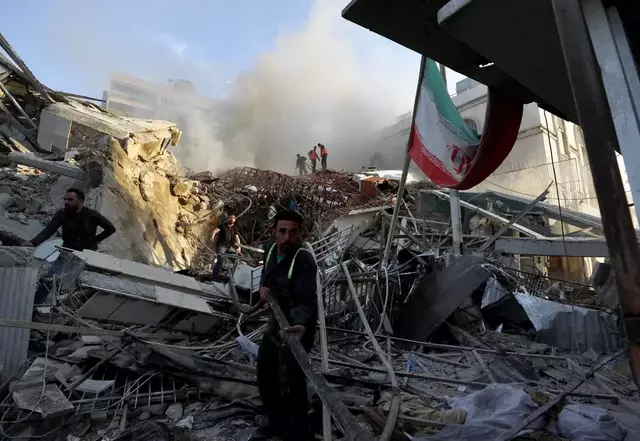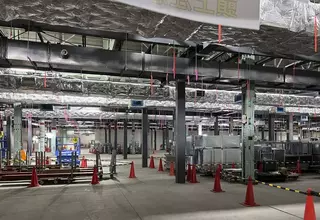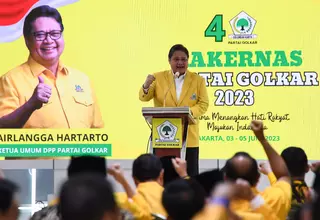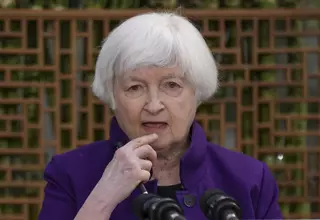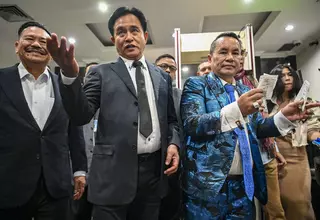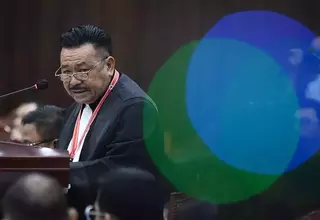Commentary: What Faith Can Do for Global Systemic Challenges

"Values cannot be justified by the intellectual process alone. Faith must be involved," Professor Klaus Schwab, Founder and Executive Chairman of the World Economic Forum, to the Global Agenda Council on the Role of Faith, 26 October 2015.Values are often rooted in faith. And if 84 percent of the world believes in something greater than itself, it stands to reason that the faith factor will influence and impact global systemic challenges, issues which the World Economic Forum has identified as vital for global collaboration.
Different faith traditions — despite different points of departure — can contribute to a common ethical and explanatory framework to make sense of the 21st century’s dizzying change.
Faith communities can also represent a key ingredient to a flourishing society. Possessing the wisdom of long memory, as well as the desire to do the right thing by future generations, faith communities have always contributed to an inter-generational common good.
In the present, as innovation races through industries, faith communities can act as a moral bulwark against the corruption that comes with a lack of legal framework.
Anticipating the future, faith communities can also serve as an early warning system towards unethical behavior. This capacity to act as a moral reference point is essential to the conversation about what a global society wants to become.
Faith communities are also de facto trust networks.
They can transcend divides, validating or invalidating different approaches to the common good.
As such, they are also natural distribution networks. Malaria was reduced in Nigeria once Muslims and Christians agreed to fight the same mosquitos — through the distribution of nets — that were biting the Muslims on Friday and the Christians on Sunday.
With all these influences combined, and despite the challenges of extremism, the faith factor will play a significant role in social cohesion, and therefore political stability. And without stability, there is no opportunity to meaningfully address global challenges.
In short, faith communities are networks of networks, with an inherent moral framework, that can prompt action on any issue in the world today.
The list below suggests ways in which the faith factor might influence key global challenges, and is followed by a series of thought pieces that expound on many of these issues further.
1. Food security and agriculture
Humanity’s relationship with the land, and the food it produces, has always been a spiritual one. Farmers have always prized their plot of land, praying for the good weather that would enable good fruit. The ritual regulation (what one can/cannot eat) and obligation (e.g. fasting) has had indelible impact upon faith communities, especially in cultures where they are the majority. Externally, feeding the hungry has always been a core concern for the major faith traditions. Faith communities are also concerned about animal rights and how livestock is brought to slaughter.
2. Economic growth and social inclusion
Faith communities are going to have something to say about the “other,” about living the Golden Rule (treating others as you wish to be treated) and welcoming the stranger. Religions also offer a critique of unlimited growth and selfish consumerism. In fact, religion plays both negative and positive roles in relation to inclusive growth. On the one hand, religion-related hostilities, prejudices and biases inhibit inclusive growth. On the other, religion related actors have a tremendous capacity for doing good, with most religious groups being known for their programs to address poverty and/or care for the poor.
3. Employment, skills and human capital
The faith factor puts employment and skills within the framework of the inherent dignity of human capital (which also includes social and spiritual capital). Such a perspective has profound implications for understanding the dignity of work, the distribution of work and the right kind of education.
4. Environment and natural resource security
As with food security, faith communities simply feel called by something greater than themselves to steward the earth. There is a responsibility to do so (as, for example, the recent Papal encyclical calling for urgent action on climate change makes clear). Faith communities have been particularly mobilized about this issue and should be practically engaged by the business community.
5. Future of the global financial system
Faith and faith communities are essential to addressing two central challenges for the future of the global financial system: trust and inclusion. Genuine trust, weakened dramatically since the 2008 global financial crisis, rests most basically on relationships. Faith also drives conceptions of human dignity, justice, and care which compel affordable inclusion and access to quality financial services especially for the more than 2 billion people currently underserved. Finally, faith-rooted justice helps to shape transparent and moral regulatory systems both to enable economic flourishing and to curb financial wrongdoing.
6. Future of the internet
The internet has provided a new form of media for faith to be expressed and channelled in contemporary society. Religious leaders are now communicating far beyond their traditional “flock” to present values and concerns to a global audience. Through networks like Facebook, new international norms are now being established to determine acceptable forms of behavior and activities. Social media has also become a powerful tool for mobilizing positive faith-based values as a response to destructive events and activities. Meanwhile, the linguistic opportunity to cross boundaries is increasingly available for the most underrepresented minority language groups in the world.
7. Gender parity
Religion, we must say, has been a part of the problem on this issue, too often validating inequality, even gender-based violence. There are few female leaders within institutional religion. Nevertheless, as a function of their faith, female leaders are bringing their beliefs to bear in how they envision, prepare for, and execute their professional roles across society. There is emerging evidence that where there is more religious freedom, for example, there is more women’s empowerment.
8. International trade and investment
Foreign direct investment and trade flourish in environments of political stability, the rule of law, and little corruption — all issues in which the faith factor can play a significant role. It is also true that people of faith are more comfortable with long-term risk, to include a long-view on innovation, or ensuring that there are transparent standards to keep a level-playing field.
9. Long-term investing, infrastructure and development
Empirical data also suggests a correlation between more religious freedom and more economic development. People of faith are more likely to have a long-term perspective, and be purpose-driven in their investments. Furthermore, infrastructure development must account for social cohesion. Architecture can contribute to the development of “safe spaces” where people of different beliefs/values can be in regular interaction, reducing stereotypes and division.
We conclude by again noting that faith is not a panacea. And religion has too often been a part of the problem. The two-page overview following this piece captures the ways in which faith can provide both a solution and exacerbate the complexity and problems across systemic global challenges.
Chris Seiple is President Emeritus and chairman of the board at the Institute for Global Engagement (IGE)
Tags: Keywords:POPULAR READS
Nissan to Make Next-Generation EV Batteries by Early 2029
Solid-state batteries are widely seen as the next step for EVs.Airlangga Set to Extend Leadership in Golkar After Election Success
Under his leadership, Golkar rose to the second position in the legislative polls and successfully made Gibran the elected vice president.Yellen Says Iran's Actions Could Cause Global 'Economic Spillovers'
Iran's missile attack on Israel early Sunday came in response to what it says was an Israeli strike on Iran's consulate in Syria.Takeaways from Prabowo's Responses to Legal Motion Contesting His Election Win
Part of the argument addresses the claim that the candidacy of Gibran Rakabuming Raka, Prabowo’s running mate, is unlawful.Prabowo Camp Cites ‘Procedural Error’ in Legal Challenge by Rival Candidates
The Constitutional Court's main task is to address alleged discrepancies in vote tallies, which neither of the plaintiffs challenged.Popular Tag
Most Popular
